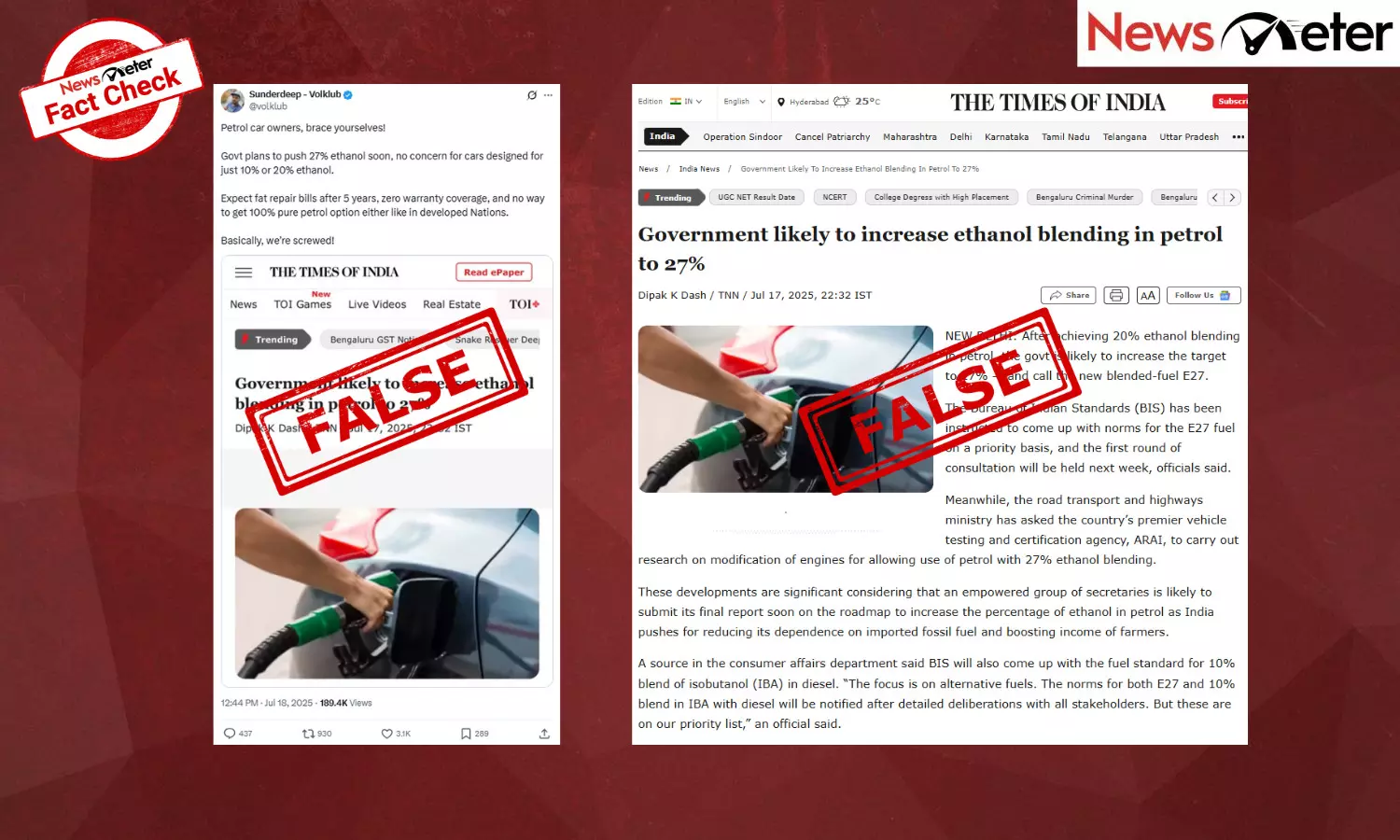Fact Check: E27 ethanol blend policy under development? No, Petroleum ministry debunks claims
A report claims that 27 per cent ethanol-blended petrol is going to be set in course soon. Here’s what the Petroleum and Natural Gas Ministry has to say.
By K Sherly Sharon
Claim:The Indian government is planning to produce 27 per cent ethanol-blended petrol
Fact:The claim is false. The Union Ministry issues a clarification that claims about a planned increase to 27 per cent, as of now, are misinformation.
Hyderabad: The Indian government has announced that the country is close to achieving its target of 20 per cent ethanol blending in petrol (E20). In this context, a report published by The Times of India claims that India is likely to increase ethanol blending in petrol to 27 per cent.
The report, dated July 17, was published with the title, ‘Government likely to increase ethanol blending in petrol to 27%.’ Quoting an unnamed official from the consumer affairs department, the report said, “Bureau of Indian Standards (BIS) has been instructed to come up with norms for the E27 fuel.” (Archive)
The report further stated, “Meanwhile, the road transport and highways ministry has asked the country’s premier vehicle testing and certification agency, ARAI, to carry out research on modification of engines for allowing use of petrol with 27 per cent ethanol blending.”
ET Auto also published a similar article on July 18.
A screenshot of the report was shared on X with the caption, “Petrol car owners, brace yourselves! Govt plans to push 27% ethanol soon, no concern for cars designed for just 10% or 20% ethanol. Expect fat repair bills after 5 years, zero warranty coverage, and no way to get 100% pure petrol option, either like in developed Nations. Basically, we’re screwed! (sic)” (Archive)
Similar posts sharing the report can be found here and here. (Archive 1 and Archive 2)
Fact Check
NewsMeter found that the claim is false. The Ministry of Petroleum and Natural Gas issued a clarification that the claims about a proposed increase of ethanol blending in petrol to 27 per cent, as of now, are misinformation.
Using a keyword search, we found a NITI Aayog report that provided information about the Ethanol Blended Petrol (EBP) Programme and its objectives.
The report ‘Roadmap for Ethanol Blending in India 2020-25’ was published in June 2021. The report suggested an annual roadmap for production and supply of ethanol till 2025-26.
The government of India launched the programme to reduce crude oil imports and environmental pollution. The program was launched in 2003 with a 5 per cent ethanol-blended petrol mandate.
This programme is on its way to achieving the target of the E20 mandate by October 2025.
The target to achieve 20 per cent ethanol blending with petrol, known as E20 fuel, was initially for 2030. However, this was advanced to Ethanol Supply Year (ESY) 2025-26.
Blending of ethanol further increased to 12.06 per cent in ESY 2022-23, 14.60 per cent in ESY 2023-24 and 17.98 per cent in ESY 2024-25 (As of February 28, 2025).
We also found a tweet by the Ministry of Petroleum and Natural Gas shared on June 30 that gave an update on the programme, where it said the ethanol blend is currently 19 per cent.
On February 11, while addressing the inaugural session at the India Energy Week 2025, prime minister Narendra Modi said that India is on course to achieve the 20 per cent ethanol mandate by October.
In a report published on June 19, Financial Express, quoting Petroleum and Natural Gas minister Hardeep Singh Puri, stated, “While talking to CNN News 18, he said, ‘India has already achieved 20 per cent ethanol blending in petrol—six years ahead of the original target of 2030’.”
A report titled ‘Government measures to increase Ethanol Blending beyond 20%’ was posted by PIB on March 20. The report stated, “So far, no decision has been taken by the Government for increasing ethanol blending beyond 20%.”
Reacting to the news reports, the Ministry of Petroleum and Natural Gas X account tweeted on July 18, calling the viral E27 claims as misinformation.
The post reads, “There is a report in a section of the media that India is planning to increase ethanol blending to 27% under the #EBP Programme…Thus, any claim about a planned increase to 27% blending at this stage is speculative, misleading, and mischievous.” (Archive)
The post explained that yearly ethanol blending targets are set by the ‘Roadmap for Ethanol Blending in India 2020-25.’ The report suggested targets until ESY 2025-2026, which is 20 per cent ethanol blending.
“For #ethanol blending targets beyond ESY 2025-26, an Inter-Ministerial Committee (IMC) has been constituted by the government to recommend future targets. The IMC is yet to submit its report. Ethanol blending targets to be recommended by the IMC starts from ESY 2026-27, i.e. from 1st Nov, 2026,” added the ministry.
The ministry also stated that developments in the matter will be brought to the notice of the citizens by the government. However, the post did not address the claims that BIS was instructed to formulate norms for E27 fuel and ARAI was directed to research engine modifications for E27 compatibility.
We did not find any notifications or press releases on the websites of BSI and ARAI regarding the instructions given to the institution concerning E27. There are no reports from the Press Information Bureau as well.
The Ministry of Petroleum and Natural Gas issued clarification regarding the claim made in the report by The Times of India and others concerning E27, calling it misinformation.
Therefore, NewsMeter concludes that the viral claim is false.